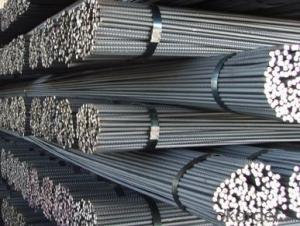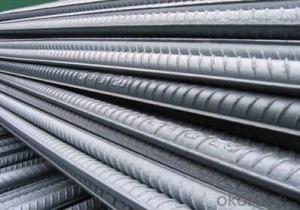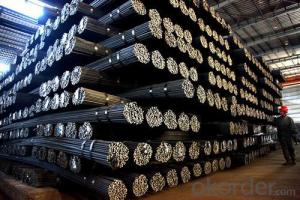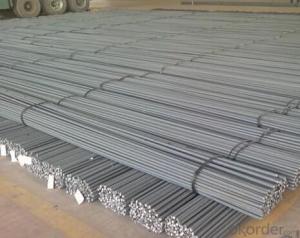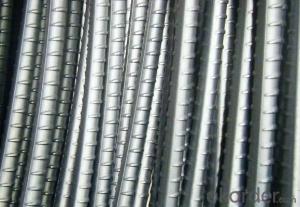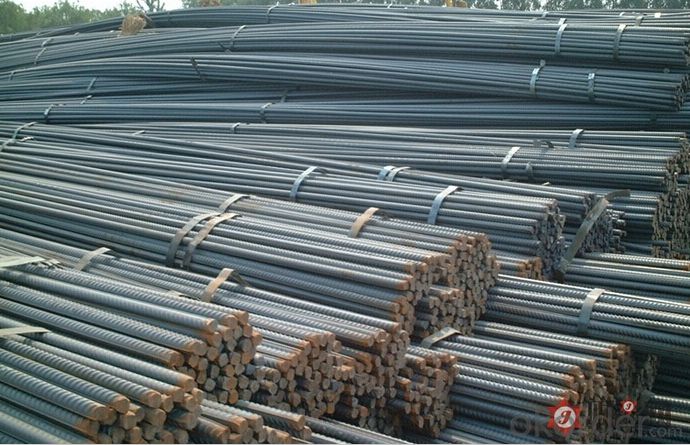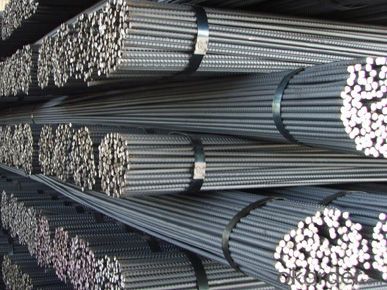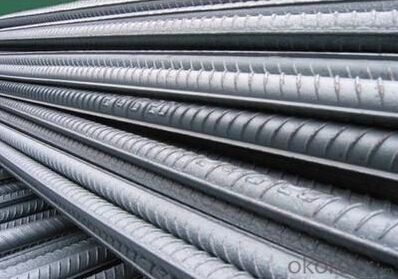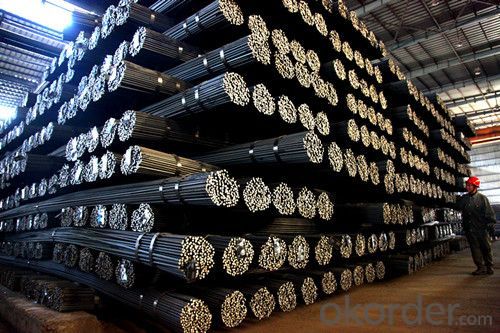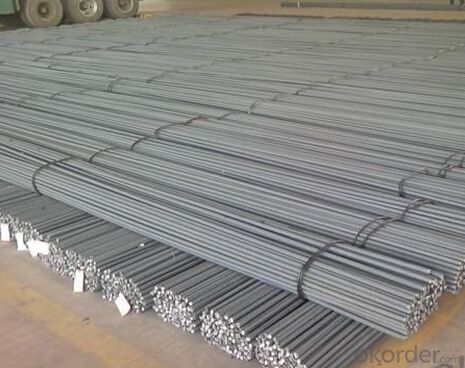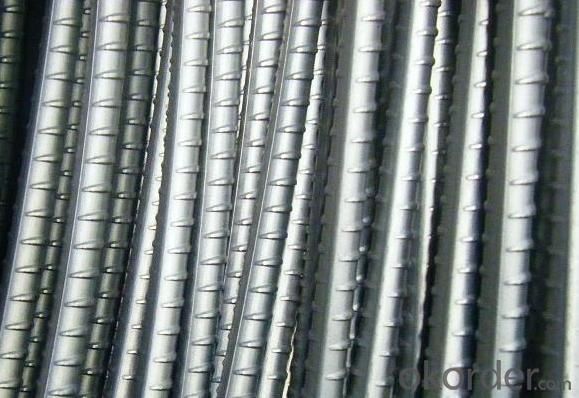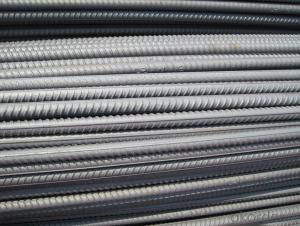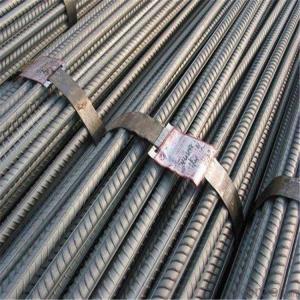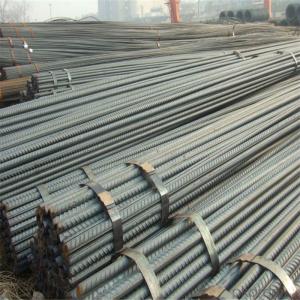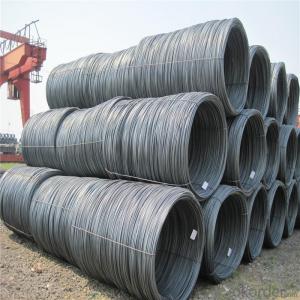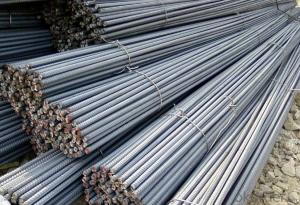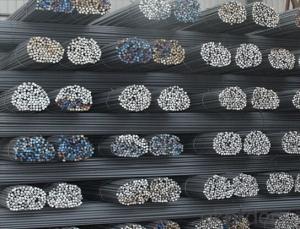BS4449 460B Reinforcing Deformed Steel Bars
- Loading Port:
- Tianjin
- Payment Terms:
- TT or LC
- Min Order Qty:
- 30 m.t.
- Supply Capability:
- 10000 m.t./month
OKorder Service Pledge
OKorder Financial Service
You Might Also Like
Specification
BS4449 460B Reinforcing Deformed Steel Bars
Details of BS4449 460B Reinforcing Deformed Steel Bars
Name | Deformed Bar |
Shape | Round Bar |
Standard | 1.GB1499.2-2007, HRB335, HRB400E 2. ASTM A615 Gr.40, Gr.60 3.BS4449/1997 |
Diameter | 6mm-50mm |
Length | 6m, 8m, 9m,12m as standard or as request |
Test | SGS/UT 100% Elements Testing |
Certificate: | ISO/Mill Certificate |
Service: | 24 hours online service / |
more than 20 years trading and manufacture | |
Quality Assurance: | the third party inspection, such as SGS, BV, TUV…etc. is acceptable |
Packaging Details: | Seaworthy Packaging or as per customer's packing instruction |
Specification of BS4449 460B Reinforcing Deformed Steel Bars
Standard | Grade | Yield Strength Mpa | Tensile Strength | Elongation% |
BS4449:1997 | 250 | 250 | 295 | 22 |
460A | 460 | 485 | 12 | |
460B | 460 | 500 | 15 | |
GB1499.2-2007 | HRB335/335E | 335 | 455 | 17 |
HRB400/400E | 400 | 540 | 17 | |
HRB500/500E | 500 | 630 | 16 | |
ASTM A615 & A615M-04a | GRADE40 | 280 | 420 | 12 |
GRADE60 | 420 | 620 | 9 | |
GRADE75 | 520 | 690 | 7 | |
JIS G3112-2004 | SD295A | ≥ 295 | 440-600 | 17 |
SD295B | 295-390 | ≥ 440 | 17 | |
SD345 | 345-440 | ≥490 | 19 | |
SD390 | 390-510 | 560 | 17 | |
SD490 | 490-625 | ≥ 620 | 13 |
Size | WEIGHT | WEIGHT | QUANTITY | ||
LENGTH 6M | LENGTH 12M | LENGTH 6M | LENGTH 12M | ||
6 | 0.222 | 1.332 | 2.664 | 751 | 375 |
8 | 0.395 | 2.37 | 4.74 | 422 | 211 |
10 | 0.617 | 3.702 | 7.404 | 270 | 135 |
12 | 0.888 | 5.328 | 10.656 | 188 | 94 |
14 | 1.21 | 7.26 | 14.52 | 138 | 69 |
16 | 1.58 | 9.48 | 18.96 | 106 | 53 |
18 | 2 | 12 | 24 | 83 | 42 |
20 | 2.47 | 14.82 | 29.64 | 67 | 34 |
22 | 2.98 | 17.88 | 35.76 | 56 | 28 |
25 | 3.85 | 23.1 | 46.2 | 43 | 22 |
28 | 4.83 | 28.98 | 57.96 | 35 | 17 |
32 | 6.31 | 37.86 | 75.72 | 26 | 13 |
36 | 7.99 | 47.94 | 95.88 | 21 | 10 |
40 | 9.87 | 59.22 | 118.44 | 17 | 8 |
50 | 15.42 | 92.52 | 185.04 | 11 | 5 |
CNBM Introduction of BS4449 460B Reinforcing Deformed Steel Bars
CNBM International Corporation is the most import and export platform of CNBM group(China National Building Material Group Corporation) ,which is a state-owned enterprise, ranked in 270th of Fortune Global 500 in 2015.
With its advantages, CNBM International are mainly concentrate on Cement, Glass, Iron and Steel, Ceramics industries and devotes herself for supplying high quality series of refractories as well as technical consultancies and logistics solution.
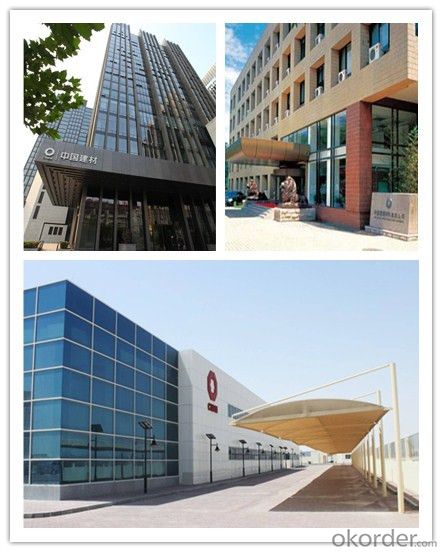
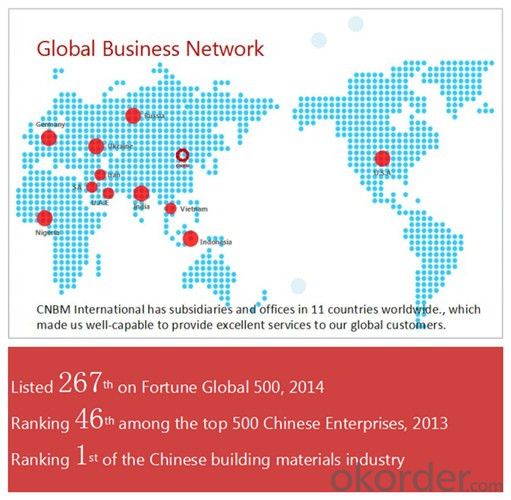
Packaging & Delivery of BS4449 460B Reinforcing Deformed Steel Bars
Packaging Detail | Sea worthy packing /as per customer's packing instruction |
Delivery Detail | 15 ~ 40 days after receiving the deposit |
Products Show
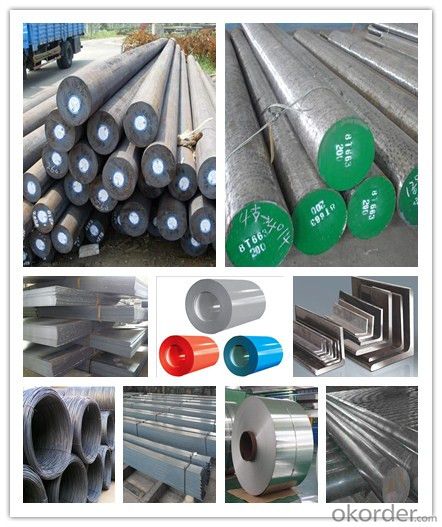
FAQ:
Are you a trading company or manufacturer? | Manufacturer |
What’s the MOQ? | 3 metric ton |
What’s your delivery time? | 15-35 days after downpayment received |
Do you Accept OEM service? | Yes |
what’s your delivery terms? | FOB/CFR/CIF |
What's the Payment Terms? | 30% as deposit,70% before shipment by T/T |
Western Union acceptable for small amount. | |
L/C acceptable for large amount. | |
Scrow ,Paybal,Alipay are also ok | |
Why choose us? | Chose happens because of quality, then price, We can give you both. Additionally, we can also offer professional products inquiry, products knowledge train (for agents), smooth goods delivery, excellent customer solution proposals. |
What's your available port of Shipment? | Main Port, China |
What’s your featured services? | Our service formula: good quality+ good price+ good service=customer's trust
|
Where are your Market? | Covering more than 160 countries in the world |
- Q: What are the main characteristics of electrical steel?
- Electrical steel, also known as silicon steel or transformer steel, offers several key features that make it suitable for use in electrical appliances and power equipment. Firstly, it possesses a high magnetic permeability, enabling efficient magnetic flux conduction and reducing energy losses in transformers, motors, and generators. Secondly, electrical steel demonstrates low core loss, encompassing hysteresis loss and eddy current loss. Hysteresis loss refers to the dissipation of energy caused by the reversal of magnetic domains within the material, while eddy current loss arises from circulating currents induced by alternating magnetic fields. The low core loss property of electrical steel ensures high energy efficiency and minimizes heat generation in electrical devices. Another significant characteristic of electrical steel is its high electrical resistivity, which diminishes the magnitude of eddy currents and further reduces energy losses in electrical equipment. Additionally, it possesses a high saturation induction, denoting its ability to reach maximum magnetic flux density. This characteristic enables transformers and motors to function at higher magnetic flux densities, resulting in more compact and efficient designs. Moreover, electrical steel exhibits high mechanical strength, essential for withstanding the stresses and vibrations encountered in electrical devices. It also demonstrates good thermal conductivity, facilitating efficient heat dissipation and enhancing the overall performance and longevity of electrical equipment. In conclusion, electrical steel boasts high magnetic permeability, low core loss, high electrical resistivity, high saturation induction, high mechanical strength, and good thermal conductivity. These properties make it an ideal material for various electrical applications, offering efficiency, reliability, and performance in power generation, transmission, and utilization.
- Q: What are the specific requirements for special steel used in the automotive piston industry?
- The specific requirements for special steel used in the automotive piston industry are designed to ensure high performance, durability, and efficiency of the pistons. These requirements include: 1. High strength: Special steel used in automotive pistons must possess high tensile strength and hardness to withstand the extreme pressures and temperatures generated during combustion. 2. Heat resistance: The steel must have excellent heat resistance properties to withstand the intense heat generated by the combustion process without deforming or losing strength. 3. Wear resistance: Pistons undergo constant friction and wear against the cylinder walls. Therefore, the special steel used must have good wear resistance to minimize the wear and tear and prolong the lifespan of the piston. 4. Low thermal expansion: The steel should have a low coefficient of thermal expansion to prevent excessive expansion and contraction during temperature variations, ensuring a tight seal between the piston and cylinder walls. 5. Corrosion resistance: Pistons are exposed to various corrosive elements, including combustion by-products and engine oil. Special steel used in piston manufacturing must have good corrosion resistance to prevent premature deterioration and failure. 6. Fatigue resistance: The steel should possess excellent fatigue resistance to withstand the repetitive stress cycles experienced by the piston during engine operation. 7. Machinability: Special steel used in pistons should be easily machinable to achieve precise dimensions and tolerances necessary for optimal performance. 8. Cost-effectiveness: While meeting the above requirements, special steel used in the automotive piston industry should also be cost-effective to ensure profitability for the manufacturers. By meeting these specific requirements, special steel used in the automotive piston industry contributes to the overall performance, reliability, and longevity of the piston, which in turn enhances the efficiency and durability of the entire engine system.
- Q: What are the main characteristics of spring steel?
- Spring steel is a type of high-carbon steel known for its exceptional elasticity and resilience. Its main characteristics include high tensile strength, excellent fatigue resistance, and the ability to withstand repeated bending or twisting without permanent deformation. Spring steel also exhibits good corrosion resistance, making it suitable for various applications where durability and flexibility are required, such as springs, clips, and automotive components.
- Q: What are the properties of cobalt-based alloys?
- Cobalt-based alloys possess excellent strength, corrosion resistance, and high-temperature stability, making them suitable for various applications such as aerospace, medical implants, and industrial machinery. They also exhibit magnetic properties, good wear resistance, and the ability to withstand extreme environments, making them highly versatile and sought after in various industries.
- Q: How is special steel made?
- Special steel undergoes a complex and precise manufacturing process, consisting of various steps. Initially, high-quality raw materials like iron ore and scrap metal are carefully chosen and then melted in a furnace at extremely high temperatures. This procedure eliminates impurities and forms molten steel. Once the molten steel is obtained, it is further refined to achieve the desired composition and properties. This is accomplished by adding various alloying elements like chromium, nickel, manganese, and vanadium. These elements enhance the steel's strength, hardness, corrosion resistance, and other specific characteristics necessary for the intended application. Following that, the molten steel is cast into different shapes, such as bars, slabs, or billets, using a process called casting. During casting, the steel is poured into molds and allowed to cool and solidify. The resulting solidified steel is then processed further using techniques like rolling, forging, or extrusion to achieve the desired shape and dimensions. After shaping, the steel undergoes heat treatment, which involves controlled heating and cooling processes. Heat treatment refines the steel's microstructure, improving its mechanical properties. This can involve processes like quenching, tempering, annealing, or normalizing, depending on specific requirements. Finally, the steel is subjected to thorough testing and quality control measures to ensure compliance with required specifications and standards. These tests encompass mechanical, chemical, and physical analyses, as well as non-destructive testing techniques, to verify the integrity and performance of the special steel. In summary, the production of special steel is a highly technical and specialized process that entails meticulous selection of raw materials, precise alloying, casting, shaping, heat treatment, and rigorous quality control. The end result is a steel with exceptional properties that can be tailored to meet the specific needs of diverse industries, including automotive, aerospace, construction, or manufacturing.
- Q: How does special steel contribute to the energy equipment industry?
- Special steel plays a crucial role in the energy equipment industry by providing materials with superior strength, durability, and corrosion resistance. These properties enable the production of high-performance components such as turbine blades, pressure vessels, and pipelines, which are essential for power generation, transmission, and distribution. Additionally, special steel's ability to withstand extreme temperatures and harsh operating conditions enhances the efficiency and reliability of energy equipment, ultimately contributing to the overall sustainability and advancement of the industry.
- Q: What are the different types of precipitation-hardening steel?
- There are several different types of precipitation-hardening steel, including 17-4 PH, 15-5 PH, 13-8 PH, and 17-7 PH. These alloys are known for their ability to be strengthened through a precipitation hardening process, which involves a combination of heat treatment and aging. Each type of precipitation-hardening steel has its own unique composition and properties, making them suitable for various applications in industries such as aerospace, automotive, and medical.
- Q: What are the requirements for special steel used in food processing equipment?
- Ensuring the safety and hygiene of food during processing relies heavily on the crucial requirements for special steel used in food processing equipment. The following are key considerations: 1. Corrosion resistance: The steel utilized in food processing equipment must possess exceptional resistance against corrosion. It should withstand exposure to various food products, cleaning agents, and environmental conditions without degradation or food contamination. 2. Hygienic properties: To facilitate easy cleaning and prevent the growth of harmful microorganisms, the steel should have a smooth surface finish, devoid of cracks, pits, or crevices where bacteria or food particles can accumulate. 3. Non-reactivity: The steel employed in food processing equipment must not react with the food or modify its taste, color, or odor. It should be chemically inert, releasing no substances that could compromise the food's quality or cause contamination. 4. High temperature resistance: Food processing often involves high-temperature operations like cooking, sterilization, or pasteurization. Therefore, the special steel used in such equipment must endure these extreme temperatures without compromising its structural integrity or releasing harmful substances. 5. Mechanical strength: The steel must possess adequate mechanical strength to endure the operational stresses of the processing equipment, such as pressure, vibration, or impact. This ensures durability and prevents any failures or breakages during operation. 6. Compliance with regulations: The special steel utilized in food processing equipment must meet specific regulatory standards and certifications pertaining to food safety and hygiene, such as those set by the FDA (Food and Drug Administration) or NSF (National Sanitation Foundation). Complying with these regulations guarantees the equipment's suitability for use in the food industry. In summary, the requirements for special steel used in food processing equipment focus on ensuring the equipment's durability, cleanliness, and safety while upholding the quality and integrity of the processed food.
- Q: What are the different types of corrosion that special steel can encounter?
- Special steel has the potential to encounter a variety of corrosion types, including: 1. Uniform corrosion: This is the prevailing form of corrosion, where the steel's entire surface corrodes uniformly. It typically occurs when the steel is exposed to aggressive environments, such as corrosive chemicals or high levels of humidity. 2. Pitting corrosion: Pitting corrosion manifests as localized corrosion attack in the form of small pits or cavities on the steel's surface. It can arise from chloride ions or other aggressive substances and can be particularly damaging as it can lead to crack formation. 3. Crevice corrosion: Crevice corrosion arises within narrow gaps or crevices between steel surfaces, such as junctions, gaskets, or beneath deposits. It is caused by limited oxygen access and the accumulation of corrosive agents, resulting in localized corrosion and potential damage. 4. Galvanic corrosion: Galvanic corrosion arises when two dissimilar metals come into contact within an electrolyte. In special steel, this can occur when it comes into contact with another metal in a corrosive environment, resulting in accelerated corrosion of the less noble metal. 5. Stress corrosion cracking: This type of corrosion ensues due to the combined effects of tensile stress and a corrosive environment. It can cause the steel to crack and fail, even under relatively low stress levels. Special steel is often prone to stress corrosion cracking in specific environments, such as high chloride or acidic solutions. 6. Intergranular corrosion: Intergranular corrosion manifests along the grain boundaries of steel, typically due to the segregation of impurities during the steel's manufacturing process. It can weaken the material and lead to premature failure. To prevent or reduce the occurrence of these corrosion types, special steel can undergo treatment with various corrosion-resistant coatings, such as paints, metallic coatings, or alloys with high corrosion resistance. Moreover, proper material selection, design considerations, and regular maintenance can also aid in minimizing the risk of corrosion in special steel applications.
- Q: Can special steel be used in the pharmaceutical manufacturing industry?
- Yes, special steel can be used in the pharmaceutical manufacturing industry. Special steel is often chosen for its high corrosion resistance, hygiene, and cleanability properties. It is commonly used in the production of pharmaceutical equipment such as tanks, vessels, valves, and piping systems to ensure the quality and safety of pharmaceutical products.
Send your message to us
BS4449 460B Reinforcing Deformed Steel Bars
- Loading Port:
- Tianjin
- Payment Terms:
- TT or LC
- Min Order Qty:
- 30 m.t.
- Supply Capability:
- 10000 m.t./month
OKorder Service Pledge
OKorder Financial Service
Similar products
Hot products
Hot Searches
Related keywords

